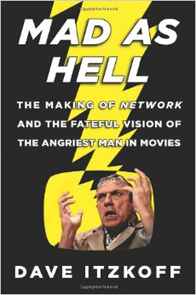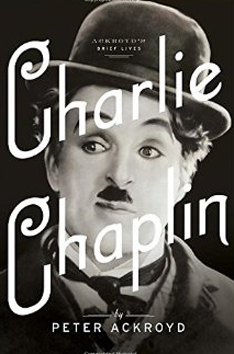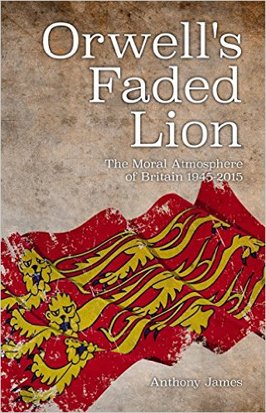Book Reviews: ‘Mad as Hell’, ‘Charlie Chaplin’, & ‘Orwell’s Faded Lion’
The book on the film
‘Mad as Hell: The Making of Network and the Fateful Vision of the Angriest Man in Movies’, by Dave Itzkoff (Times Books, 2014)
 In 1976, MGM released Paddy Chayefsky’s Network, a film that would change the way people saw television. It tells the story of Howard Beale, the distinguished senior anchorman of a major American network, who suffers an on-air breakdown. ‘I’m going to blow my brains out right on this program a week from today,’ he announces, explaining that he ‘just ran out of bullshit’ to broadcast. The network executives are horrified and plan on firing him, but after seeing the effect his rants had on the show’s ratings, decide to keep him on. An increasingly inflamed Beale abandons all pretence of objectivity and uses his top-rated show to whip millions into a frenzy over the injustices he sees in society. Impressed, the network commissions a slate of new programmes showcasing violent crime, terrorism, political extremism, and paranoid prophecies of doom—all with the sole purpose of channelling viewers’ fear and outrage into market share and advertising revenue.
In 1976, MGM released Paddy Chayefsky’s Network, a film that would change the way people saw television. It tells the story of Howard Beale, the distinguished senior anchorman of a major American network, who suffers an on-air breakdown. ‘I’m going to blow my brains out right on this program a week from today,’ he announces, explaining that he ‘just ran out of bullshit’ to broadcast. The network executives are horrified and plan on firing him, but after seeing the effect his rants had on the show’s ratings, decide to keep him on. An increasingly inflamed Beale abandons all pretence of objectivity and uses his top-rated show to whip millions into a frenzy over the injustices he sees in society. Impressed, the network commissions a slate of new programmes showcasing violent crime, terrorism, political extremism, and paranoid prophecies of doom—all with the sole purpose of channelling viewers’ fear and outrage into market share and advertising revenue.
Network caused a sensation when it was released. It was loudly denounced by television journalists, who saw it as an unconscionable attack on the nobility of their profession, but it went on to sweep the Academy Awards with a record-setting ten nominations and four wins. Despite this, the film is virtually unknown to today’s audiences—and when it is shown at all, viewers take it as a straight-up drama rather than the sly but radical comedy it was written and received as in the 1970s. As contemporary screenwriter Aaron Sorkin aptly put it, ‘No predictor of the future—not even Orwell—has ever been as right as Chayefsky was when he wrote Network.’
In Mad as Hell, Dave Itzkoff of The New York Times recounts the curious story of how a film as anti-establishment as Network ever made it to the big screen. In Itzkoff’s analysis, that Network got produced at all may well have been a happy historical accident: MGM had found themselves missing out on the counterculture wave that was sweeping Hollywood, and so, desperate for a box office hit of their own, acceded to veteran screenwriter Paddy Chayefsky’s demands for total creative control over his next film. Chayefsky used this highly unusual grant of authority—which exceeded even that of the film’s director—to ensure that his dystopian world was faithfully translated from screenplay to film. That Network so pointedly attacked the medium of television was of no concern to the studio, which at the time had no relationship to any television networks apart from the occasional sale of broadcasting rights for their films. Whether MGM would have produced such a film today is another matter entirely. ‘In an age when all the major broadcast networks are now either owned by or affiliated with a motion picture and entertainment conglomerate,’ observes Itzkoff, ‘it is hard to imagine a studio turning its guns on itself the same way.’
Mad as Hell faithfully documents Network’s entire production process, from early drafts of the screenplay up to postproduction and pre-release marketing, and goes on to recount and analyze the controversy and critical acclaim the film garnered upon its release. Of greatest interest, however, is the book’s final chapter, which discusses how Chayefsky’s nightmarish vision of a world that has eroded away the distinction between information and entertainment has finally come to pass. Itzkoff attributes this to a significant relaxation in antitrust laws and federally mandated broadcasting standards, coupled with a proliferation of cable TV channels. While journalism has never been truly objective, before 1987 US broadcasters were at least nominally required to be honest and to provide contrasting views. Itzkoff explains how ‘informational’ television today is dominated by shallow, tabloid-style programming, making good use of interviews with veteran newsmen who have variously resisted and embraced the new regime.
Itzkoff is equally astute at identifying the film’s enduring contribution to popular political discourse. Though neither Paddy Chayefsky nor his mouthpiece Howard Beale are socialists, they are both acutely aware of the ills of global capitalism and of the urgent necessity of the population at large taking some sort of radical, corrective action. (‘We are right now living in what has to be called a corporate society, a corporate world, a corporate universe,’ laments Beale at one point in the film. ‘This world quite simply is a vast cosmology of small corporations orbiting around larger corporations who, in turn, revolve around giant corporations, and this whole, endless, ultimate cosmology is expressly designed for the production and consumption of useless things.’) Network, Itzkoff concludes, was all about ‘awakening its viewers to ugly and unflattering truths about their lives and the world they inhabited, and it did not communicate its messages in a subtle or soft-spoken manner: it put its most urgent and passionate ideas in the mouth of a man who at times is literally screaming them at his audience, commanding them to go to their windows and scream their dissatisfaction themselves.’ Indeed, what sets Beale apart from his countless successors—both in the film and in real life—are his perceptiveness and sincerity. He proclaims himself to be ‘mad as hell’, but he is not deranged; he is lucid and insightful, and his anger is no mere shtick. The real tragedy of Beale—and of Chayefsky—may be that they failed to offer their enraptured viewers any real solution to the problems they so effectively articulated.
TRISTAN MILLER
************************************************************
Recent Times
‘Charlie Chaplin’, by Peter Ackroyd. Vintage £7.99.
 Charlie Chaplin was born in a South London slum in 1889. His childhood was extremely impoverished, including spells in a workhouse, and his first show-business job was as a clog dancer at the age of nine. He became an actor and stage performer, joined Fred Karno’s company and travelled to the US, where he made his first film in 1914. He survived the birth of talkies and became a director and independent film-maker. Already by 1915, according to Ackroyd, he was the most famous man in the world.
Charlie Chaplin was born in a South London slum in 1889. His childhood was extremely impoverished, including spells in a workhouse, and his first show-business job was as a clog dancer at the age of nine. He became an actor and stage performer, joined Fred Karno’s company and travelled to the US, where he made his first film in 1914. He survived the birth of talkies and became a director and independent film-maker. Already by 1915, according to Ackroyd, he was the most famous man in the world.
Chaplin was best known for his screen persona as the Tramp, the ‘little fellow’ who became a kind of universal symbol of failure and hopelessness. Some of his films were overtly political, such as The Great Dictator (1940), where he played Adenoid Hynkel. This applied in particular to Modern Times (1936), about factory life and the repetitive and dehumanising nature of the production line.
In the First World War, he decided to stay in the US rather than return to the UK and risk being conscripted; people sent him envelopes with white feathers in, and some British cinemas stopped showing his films. During the Second World War, he made remarks supporting the ‘Soviet Union’ as a wartime ally, and also expressed some admiration for Stalin. Together with the implied message of Modern Times, this led in the late 1940s to trouble with the House Un-American Activities Committee. Some thought it suspicious that he had lived in the US for thirty years without becoming a US citizen, and in 1952, as he and his family sailed to Britain, his permit to re-enter the US was withdrawn (though he was later allowed to visit). For some discussion of his political views, see www.cartoonresearch.com/gerstein/chaplin/commie.html.
Ackroyd describes Chaplin as ‘a libertarian with tendencies towards anarchism’. But this is hardly compatible with his authoritarian approach to directing, his support for President Roosevelt, and his chauvinistic attitude to women. He also accepted a knighthood and was very concerned to protect his US-based property and investments. Though he was hardly consistent, he is perhaps best seen as someone who, looking back at his impoverished childhood, identified with the poor and downtrodden, but had no ideas about restructuring or even reforming society. Claims about him being a ‘Communist’ say more about the hysteria prevalent in some circles in the US than about Chaplin himself.
PB
************************************************************
Lion That Failed to Roar?
Orwell’s Faded Lion. Anthony James. Imprint Academic. £14.95. 2015.
 The focus for this book is the ‘Moral Atmosphere of Britain 1945-2015’ as the subtitle would have it, and it is an entertaining and potentially thought-provoking read. The book examines the evolution of British society since Orwell wrote about Britain as the Second World War was coming to an end. James has travelled widely and he is able to draw on many of his experiences to give a comparative slant to his observations. He especially focuses on Britain’s insularity and failure to live up to the revolutionary hopes he says Orwell had for it.
The focus for this book is the ‘Moral Atmosphere of Britain 1945-2015’ as the subtitle would have it, and it is an entertaining and potentially thought-provoking read. The book examines the evolution of British society since Orwell wrote about Britain as the Second World War was coming to an end. James has travelled widely and he is able to draw on many of his experiences to give a comparative slant to his observations. He especially focuses on Britain’s insularity and failure to live up to the revolutionary hopes he says Orwell had for it.
He writes from a generally radical and leftist perspective without any transparent alignment with any particular political party. As often seems to be the case with books like this, much is traced back to the Thatcher era and its shortcomings, though perhaps without a full recognition of the wider economic forces within capitalism that brought this sort of phenomenon about (including, over time, in other countries).
While well-written in many respects, the book suffers structurally. This is mainly because it is part political tract, partly a collection of literary critiques and part personal memoir. It is the latter that appears to be its greatest strength – while the politics is quite strong on the analysis there seems little by way of clear solution proffered, while the literary sections read rather like a series of mini-book reviews of the works of the major authors of post-war British fiction melded together, not altogether successfully. The style is journalistic and the narrative thread that links these various elements is not perhaps as strong as it might be.
The best section relates to a period James spent in a South Wales hospital and turns out to be the inspiration for the book. It examines the treatment he received, the conditions of the hospital workers and – most perturbing of all – the views of a number of the fellow patients he was forced to share a ward with. Let’s just say the fact that UKIP got around 20 per cent of the vote in many South Wales valley seats at the recent General Election is entirely consistent with the account here and the interpretation James places on it. The challenge is still how to transform these types of views within the working class and the assumptions that seem to underpin them.
DAP
